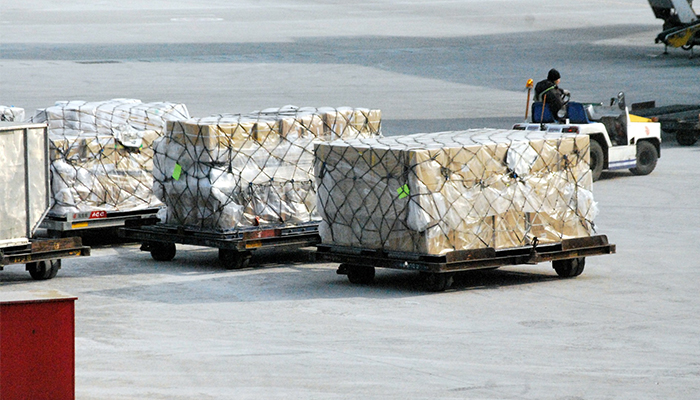
Middle Eastern carriers see 10.9% year-on-year increase in cargo volumes
Muscat: Middle Eastern carriers had the strongest performance in October 2023, with a 10.9 percent year-on-year increase in cargo volumes, according to a new report.
“This was a significant improvement from the previous month’s performance (+2.5 percent), the International Air Transport Association (IATA) said in its latest data for October 2023 global air cargo markets.
Indicating that this is the third consecutive month of stronger year-on-year demand, the IATA report said that carriers in the region benefited from growth in the Middle East–Asia (+10.3 percent) and Middle East–Europe markets (+17.1 percent). Capacity increased 15 percent compared to October 2022, the report added.
IATA in its latest report furthat said that Asia-Pacific airlines saw their air cargo volumes increase by 7.6 percent in October 2023 compared to the same month in 2022. This performance was close to par with the previous month (+7.7 percent). Carriers in the region benefited from ongoing growth in international cargo tonne-kilometres (CTK’s) on three major trade lanes: Africa-Asia (+16.7 percent, the greatest annual growth since May), Middle East-Asia (+10.3 percent) and Europe-Asia (+8.5 percent).
Available capacity for the region’s airlines increased by 30 percent compared to October 2022 as more belly capacity came online from the passenger side of the business (a year ago, the key Asian markets of Japan and China were still largely under severe COVID-19 travel restrictions).
Global demand, measured in CTKs, increased by 3.8 percent compared to October 2022. For international operations, the demand lagged slightly at 3.5 percent.
Capacity, measured in available cargo tonne-kilometres (ACTKs), was up 13.1 percent compared to October 2022 (11.1 percent for international operations). This was largely related to the growth in belly capacity. International belly capacity, for example, rose 30.5 percent year-on-year on the strength of passenger markets.
Several factors
The IATA report said that economic activities slowed in October. With the Purchasing Managers’ Index for manufacturing output and export orders for major economies (excluding the US) remaining below the critical 50 mark, there is a clear marker for economic challenges ahead.
Inflation in major advanced economies continued to ease from its peak in terms of Consumer Price Index (CPI), reaching between 3 percent and 4 percent for the US and for the EU respectively, in October. China’s CPI, however, indicated deflation for the second time this year, raising concerns of an economic slowdown.
Global trade reversed its downward trajectory and stabilised in September. Although below its 2022 peak, global cross-border trade is more than 5 percent above pre-pandemic levels.
After a continuous 17-month decline, cargo yields ticked-up in September and continued into October with a 2.6 percent month-on-month gain, remaining well-above pre-pandemic levels.
“Demand for air cargo was up 3.8 percent in October. That marks three consecutive months of year-on-year growth, placing air cargo on course to end 2023 on a much stronger footing than it began the year. Recovering demand, slightly stronger yields and the uptick in trade are all good news,” said Willie Walsh, IATA’s Director General.
“But with demand still 2.4 percent below pre-pandemic levels, and much uncertainty remaining over the trajectory of the global economy, optimism must be balanced with caution. Nonetheless, a continued strong peak year-end season will certainly help the sector to manage through whatever turns the global economy might take in 2024,” he added.
North American carriers had the weakest performance in October with a 1.8 percent decrease year-on-year (YoY) in cargo volumes. This was a slight improvement in performance compared to September (-2.2 percent ). Although the North America-Asia trade lane recorded an increase in international CTK’s (from -1.8 percent in September to -0.9 percent in October) and the North America-Europe market saw a slight improvement in international CTK’s (from -2.7 percent in September to -2.1 percent in October), carriers in the region did not benefit significantly. Capacity increased by 2.4 percent compared to October 2022.
European carriers saw their air cargo volumes increase by 1 percent in October compared to the same month in 2022. This was a stronger performance than in September (-1.5 percent). Carriers in the region benefitted from the first growth in international CTK’s in the within Europe market since January 2022 (-4.2 percent in September vs +3.4 percent in October). Gains made from the expansion in the Middle East-Europe trade lane (+17.1 percent in October) also benefited carriers in the region. Capacity increased 7 percent in October 2023 compared to 2022, the IATA report said.
Latin American carriers experienced a 4 percent increase in cargo volumes compared to October 2022, a notable increase compared to the previous month’s gain (+2.3 percent). Capacity in October was up 8.3 percent compared to the same month in 2022.
African airlines saw their air cargo volumes increase by 2.9 percent in October 2023, much improved compared to September’s performance (-0.1 percent). Carriers in the region benefitted from the strongest annual growth since May (+16.7 percent). Capacity was 9.8 percent above October 2022 levels, the IATA report said.